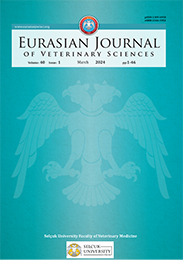| 2023, Cilt 39, Sayı 4, Sayfa(lar) 185-189 |
| [ Türkçe Özet ] [ PDF ] [ Benzer Makaleler ] |
| Detection of bovine coronavirus (BCoV) infection in cattle with clinical respiratory signs by PCR and investigation of the serological status of these animals |
| Meltem Menekse1, Atilla Simsek2 |
| 1Ceren Animal Health Laboratory, Konya, Türkiye 2Selcuk University, Veterinary Faculty, Department of Virology, Konya, Türkiye |
| Keywords: Respiratory BCoV, RT-PCR, serology |
| Downloaded:195 - Viewed: 720 |
|
Aim: It was aimed to reveal the antigenic and serological prevalence of
bovine coronavirus (BCoV) in cattle with clinically respiratory infection and
to evaluate the relationship between virus shedding and serological status of
animals in this study.
Materials and Methods: In the study, nasal swab samples were collected from a total of 92 cattle of different gender between 0 and 2 years of age with clinical respiratory symptoms. These samples were subjected to RT-PCR using specific primer pairs. Furthermore, serum samples were also collected from the same animals and evaluated for BCoV-specific antibodies through an indirect ELISA method. Results: Ten (10.87%) swap samples were defined as positive for BCoV using RT-PCR. The seropositivity rate was 93.48% (86/92) in cattle by ELISA and 90% (9/10) in virus-shedding animals with nasal swab samples. Conclusion: The fact that 93.47% seropositivity was detected in unvaccinated animals against coronavirus in this study indicates that the animals were exposed to BCoV through colostrum or at a certain period of their lives. However the fact that 9 out of 10 animals with BCoV detected in swab samples also have BCoV-specific antibodies casts doubt on the efficacy of these antibodies in protecting against respiratory BCoV infections. We concluded that more detailed studies are needed to reveal the role of antibodies in respiratory coronavirus infections. |
| [ Türkçe Özet ] [ PDF ] [ Benzer Makaleler ] |




